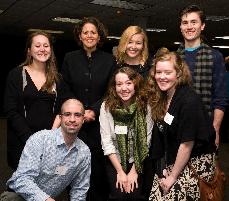Recently, Anna Deavere Smith, actor, playwright and teacher came to the Greensboro Coliseum to perform “Snapshots: Glimpses of America in Change” as a part of the 2009-10 Guilford College’s Bryan Lecture Series “The American Experience.” Smith fuses journalistic interviewing and theatrical recording, accurately depicting the characters she uses in her performances.
“If someone ends up in my play, it’s because there was some moment during that interview where I feel I have to share their voice,” said Smith.
As a playwright and performer, Smith has created a series of ongoing theatrical works over the past 19 years which she calls “On the Road: A Search for American Character.” Smith interviews real people, from Hurricane Katrina Victims to residents of Korea Town in Los Angeles whose properties were destroyed in the Rodney King riots.
After a brief introduction by Ty Buckner, vice president of marketing and Kent Chabator, president and professor of political science, Smith took the stage.
According to the New York Times Smith’s performances are known for giving voice to many political, cultural and racial viewpoints.
Smith shifted from embodying a Korean shop owner in L.A. to a doctor at a charity hospital in New Orleans, to late Texas governor Ann Richards, to a rodeo cowboy. Smith’s movements and word usage brings those characters to life in her one-woman show.
“The show began rather flatly, but before I knew it-I was gripped by the characters, she literally becomes them” said Dan Acker, a Bryan Series Subscriber.
The New York Times calls Smith, “the ultimate impressionist, she does people’s souls.”
Smith’s “Fires In The Mirror: Crown Heights, Brooklyn And Other Identities,” which explored the 1991 clash between Jews and Blacks in that New York Community, was runner up for the 1993 Pulitzer Prize.
Smith’s “Twilight: Los Angeles,” which examined the civil unrest following the Rodney King verdict, received Tony nominations.
Chabator saw Smith’s message as the power of positive thinking when faced by terminal illness or any challenge.
“Her incredible talent in taking on the personas of such a wide range of characters and situations,” said Chabator, “shows the challenge of needing more involvement by government in making access to health care fairer while also showing the incompetence of that same government in the case of Hurricane Katrina.”
Chabator also noted Smith’s heart-felt tribute to Guilford professor David Hammond, showing that educators never know where their influence ends.
David Hammond, professor of theater studies, said he considers Smith a dear friend who he once taught at the America Conservatory Theater in San Francisco. Hammond said an actor is meant to embody other people without judging them.
Hammond says Smith’s production allows the audience to see people of different backgrounds and culture in a way that they might not have before watching her. Hammond describes Smith’s work as mirroring society.
“Anna is a voice of truth. She’s incredibly honest. If you see issues in the subject matters of her act, it’s because there is one,” said Hammond.
Hammond feels productions such as Smith’s are needed more than anything in the world today, because she helps convey differing voices with a clear vision.
“Most people now walk around imposing their own view on reality based on their own system,” Hammond said.
Dan Acker, a subscriber to the Bryan Series, who attended Smith’s production, said he did not know what to expect of Smith, but was very positively impressed with the various characters and the powerful messages those characters sent.
“Anna brought to life real voices of people in very real situations,” said Acker, “these people are having difficulty. Many people are dissatisfied in our society-people who want things to work well and that’s just not the way it’s working out.”
Jack Zerbe, clerk of the faculty and chair/professor of Theatre Studies, said he was impressed by the way Smith excluded her own personal or political beliefs when researching and interviewing those whom she portrays in her acts.
Zerbe said, “I appreciate the fact that she chooses to include someone’s words in her performance based on a comment the subject makes that creates a moment of empathy that makes her think, I love you, even when disagreeing with that person’s beliefs.”
Zerbe said Smith is doing something quite quakerly: recognizing that there is ‘that of God in every one’ without demonizing or vilifying anyone.
“She implied that social change will come by building an empathic bridge across difference. Wow,” said Zerbe.
Senior Mary Pearl Monnes a theater major said, “Smith’s interviews awaken the seeds of action. I am incredibly grateful to have been able to witness this power.”
Senior Benjamin Storey a theater major said, “I was impressed by how thoroughly she could become the various people she had interviewed, using almost nothing but the power of language. Smith really zeros in on how patterns of speech reflect identity.”
Senior Jonathan Shine a theater major said, “his greatest impression wasn’t necessarily related to Smith’s innovations in theatre but her whole attitude towards life and doing work.”
Smith’s television acting career includes “Nurse Jackie,” “the West Wing” and “the Practice,” and the movies “Philadelphia,” “Dave” and “American President.”
Smith is a tenured professor in the Tisch School of the Arts at New York University and is affiliated with the NYU School of Law. She has also taught at Stanford University, Carnegie Mellon University and the University of Southern California.

